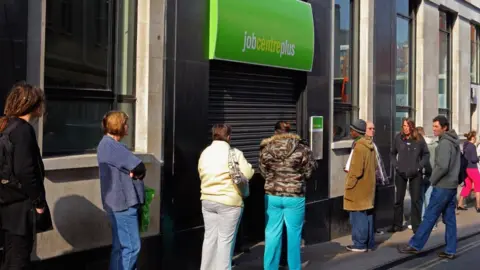Bangor mother turned to food bank after benefits delay
A working mother from Bangor, County Down, had to turn to a food bank to help feed her family when delays to her benefits left her in debt.
Sabrina Lilley's marriage broke down in November last year changing her circumstances for working tax credits.
She was moved to the new Universal Credit system but had to wait eight weeks for the money to come through.
"I've never used a food bank so it was actually really hard to ask for help," she told BBC News NI.
"I usually keep things to myself but it got to the stage it was coming up to Christmas and I was struggling."
Universal Credit combines six benefits into one single payment, including Housing Benefit and Jobseekers' Allowance.
The idea is to taper benefits as people return to work removing the idea of a "benefits trap" where people are better off on benefits than in work.
But many of those on Universal Credit are working and Ms Lilley is one of them.
She works 20 hours a week at a nursery and the sudden drop in income meant she had to increase her working hours to 30, but she feels her children have suffered as a result.
"It's helping the wee ones with homework. I used to do that after school, but now it's closer to bed time and they're tired," she said.
"I feel like I'm letting them down," she added.
Some local charities say they have seen an increase in the use of their services since the introduction of Universal Credit but not on the scale of their counterparts in Great Britain.
Alison Blayney, who heads up the Kilcooley Women's Centre, said: "The biggest impact we see is food poverty.
"If people have been on benefits or a low income and find themselves without money for several weeks they often pay their other bills first and then find they have no money for food.
"And because they have been on benefits there are no savings.
"It's not like they can say: 'I'll do my weekly shop on a Visa card'."
The Department for Communities, which is in charge of benefits payments, insists the system has been "softer" in Northern Ireland.
 Getty Images
Getty ImagesDavid Malcolm, a director of Universal Credit for the Department for Communities, said: "We started Universal Credit two years ago in Limavady.
"Since then, we've had 75,000 claims made so we're learning every month.
"Nearly nine out of 10 people are being paid the right amount of money bang on the payment date, so we're getting a lot better at paying people .
"We're getting a lot better at helping our more vulnerable customers and we're working in partnership with those who can help us reach out to those people who are still struggling."
'Advanced payments'
The five-week payment delay, which is part of the legislation, has been controversial on both sides of the Irish Sea.
But Mr Malcolm is quick to point out that people do not need to wait if they are financial difficulties: "We offer advanced payments on the first day you make a claim.
"If you need money and you need help you can get that on the very first day.
"People can make a claim for an advanced payment and usually they'll get an answer that day."
Universal Credit is also an online system for paying benefits.
That can create difficulties for people who do not have great computer skills.
Ms Lilley is computer savvy but still found it tricky: "It took me about four hours to fill it in. You have to upload photographs of documents and if you don't have a good phone it can be difficult.
"You also have an online diary where you can get in touch with the benefits office but it can be 48 hours before you get a response."
The DfC says most queries can be answered online but people can also visit a benefits office where advice is on hand.
In the most recent statistics available for Universal Credit, more than 55% on the benefits are single with 34% lone parents.
The average payment is £590 a month.
